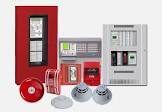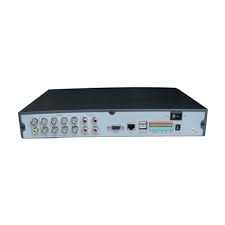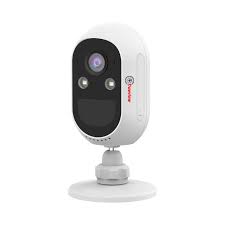In the realm of surveillance and security systems, Network Video Recorders (NVRs) have revolutionized the way we store and manage video footage. When combined with WiFi connectivity, NVRs offer even greater flexibility and convenience in monitoring and recording activities.
WiFi-enabled NVRs eliminate the need for cumbersome cables, allowing for a more streamlined installation process. This wireless feature also enables users to place cameras in locations where running cables may be challenging or impractical, providing greater flexibility in setting up a surveillance system.
With WiFi connectivity, NVRs can easily connect to your existing network, allowing you to access live camera feeds and recorded footage remotely through a smartphone, tablet, or computer. This remote accessibility provides peace of mind by allowing users to check on their properties or loved ones from anywhere at any time.
Furthermore, WiFi-enabled NVRs often come equipped with advanced features such as motion detection alerts and cloud storage options. These features enhance the overall security capabilities of the system by notifying users of any suspicious activity and ensuring that critical footage is securely stored off-site.
Overall, NVRs with WiFi capability offer a convenient and efficient solution for modern surveillance needs. Whether used for home security, business monitoring, or public safety applications, these innovative devices provide enhanced functionality and peace of mind for users seeking reliable video recording and monitoring solutions.
Top 8 Advantages of NVR WiFi Systems: Convenience, Flexibility, and Enhanced Security
- Wireless installation for easy setup
- Flexibility in camera placement without the need for cables
- Remote access to live camera feeds and recorded footage from anywhere
- Convenient monitoring through smartphones, tablets, or computers
- Advanced features like motion detection alerts enhance security capabilities
- Cloud storage options for secure off-site data backup
- Sleek and modern design without cable clutter
- Enhanced scalability by easily adding more cameras to the WiFi network
Challenges of NVR WiFi: Interference, Network Dependence, and Limited Range
- Potential for wireless interference leading to signal disruptions or video quality issues.
- Dependence on a stable WiFi network, which may be susceptible to outages or connectivity issues.
- Limited range compared to wired connections, especially in larger properties or areas with obstacles that can obstruct WiFi signals.
Wireless installation for easy setup
Wireless installation for easy setup is a standout advantage of WiFi-enabled Network Video Recorders (NVRs). By eliminating the need for complex and time-consuming cable connections, setting up a surveillance system with an NVR becomes a hassle-free process. This feature not only saves time and effort but also allows users to place cameras in strategic locations without being limited by the constraints of wired connections. The wireless installation capability of NVR WiFi systems offers unparalleled convenience and flexibility, making it an ideal choice for those looking for a user-friendly and efficient security solution.
Flexibility in camera placement without the need for cables
The key advantage of WiFi-enabled Network Video Recorders (NVRs) lies in the flexibility they offer in camera placement without the requirement of cables. This feature allows users to strategically position surveillance cameras in optimal locations without being limited by the constraints of wired connections. Whether installing cameras in hard-to-reach areas or adjusting their placement as needed, the wireless capability of NVRs simplifies the setup process and ensures a seamless and adaptable surveillance system.
Remote access to live camera feeds and recorded footage from anywhere
With WiFi-enabled Network Video Recorders (NVRs), users benefit from the valuable feature of remote access to live camera feeds and recorded footage from anywhere. This capability allows individuals to monitor their premises in real-time and review past recordings conveniently, providing a sense of security and control even when they are away. Whether checking in on their homes, businesses, or other properties, the ability to access surveillance footage remotely offers peace of mind and ensures that users stay informed about activities in their monitored areas at all times.
Convenient monitoring through smartphones, tablets, or computers
Experience the convenience of monitoring your surveillance system anytime, anywhere through smartphones, tablets, or computers with WiFi-enabled NVRs. This feature allows you to stay connected and keep an eye on your property or loved ones remotely, providing peace of mind and real-time access to live camera feeds and recorded footage at your fingertips. Whether you are at home, in the office, or on the go, the ability to effortlessly check in on your security system adds a layer of convenience and control to your everyday life.
Advanced features like motion detection alerts enhance security capabilities
The advanced feature of motion detection alerts in WiFi-enabled NVRs significantly enhances the security capabilities of surveillance systems. By automatically detecting any movement within the camera’s field of view, these alerts promptly notify users of potential threats or suspicious activities. This proactive approach not only helps in preventing security breaches but also allows for quick response and intervention, ultimately bolstering the overall effectiveness of the surveillance system in safeguarding properties and ensuring peace of mind for users.
Cloud storage options for secure off-site data backup
Cloud storage options for secure off-site data backup is a significant advantage of WiFi-enabled NVRs. By leveraging cloud storage, users can ensure that their critical video footage is securely backed up and accessible from anywhere with an internet connection. This feature not only provides an extra layer of protection against data loss due to theft or damage but also allows for convenient access to recorded footage without the need for physical storage devices. With cloud storage, users can have peace of mind knowing that their important video data is safely stored off-site, enhancing the overall reliability and security of their surveillance system.
Sleek and modern design without cable clutter
One of the standout advantages of WiFi-enabled Network Video Recorders (NVRs) is their sleek and modern design that eliminates cable clutter. By leveraging wireless connectivity, these NVRs offer a clean and minimalist aesthetic that seamlessly integrates into any environment without the need for visible cables snaking around. This not only enhances the overall appearance of the surveillance setup but also ensures a more discreet and professional installation, making it ideal for both residential and commercial settings where aesthetics play a crucial role in maintaining a polished look.
Enhanced scalability by easily adding more cameras to the WiFi network
One significant advantage of WiFi-enabled Network Video Recorders (NVRs) is the enhanced scalability they offer by allowing users to easily add more cameras to the existing WiFi network. This flexibility enables users to expand their surveillance system as needed, whether it be adding more cameras to cover additional areas or upgrading to higher-resolution cameras for improved video quality. With the ability to seamlessly integrate new cameras into the WiFi network, users can effortlessly adapt their security setup to meet evolving needs without the hassle of extensive rewiring or infrastructure modifications.
Potential for wireless interference leading to signal disruptions or video quality issues.
One significant drawback of WiFi-enabled Network Video Recorders (NVRs) is the potential for wireless interference, which can result in signal disruptions or video quality issues. Due to the reliance on wireless connectivity, NVRs may be susceptible to interference from other electronic devices operating on the same frequency band, such as routers, microwaves, or cordless phones. This interference can lead to dropped connections, lagging video feeds, or even complete signal loss, compromising the reliability and effectiveness of the surveillance system. Users considering a WiFi-enabled NVR should be aware of these potential challenges and take measures to minimize wireless interference to ensure consistent and uninterrupted video monitoring.
Dependence on a stable WiFi network, which may be susceptible to outages or connectivity issues.
One significant drawback of WiFi-enabled Network Video Recorders (NVRs) is their reliance on a stable WiFi network, which can be vulnerable to outages or connectivity issues. In situations where the WiFi signal is weak or unstable, the NVR may experience interruptions in video streaming and recording, potentially compromising the effectiveness of the surveillance system. Moreover, power outages or network disruptions can further exacerbate these issues, leading to gaps in monitoring coverage during critical moments. This dependency on a consistent and reliable WiFi connection highlights a potential limitation of WiFi-based NVRs in maintaining continuous and uninterrupted surveillance operations.
Limited range compared to wired connections, especially in larger properties or areas with obstacles that can obstruct WiFi signals.
One drawback of WiFi-enabled Network Video Recorders (NVRs) is their limited range compared to wired connections, particularly in larger properties or areas with obstacles that can obstruct WiFi signals. In such scenarios, the wireless connectivity of NVRs may struggle to maintain a stable connection over long distances or through thick walls and other physical barriers. This limitation can result in potential blind spots in surveillance coverage and may require additional networking equipment or signal boosters to overcome the range constraints, adding complexity and cost to the setup.




